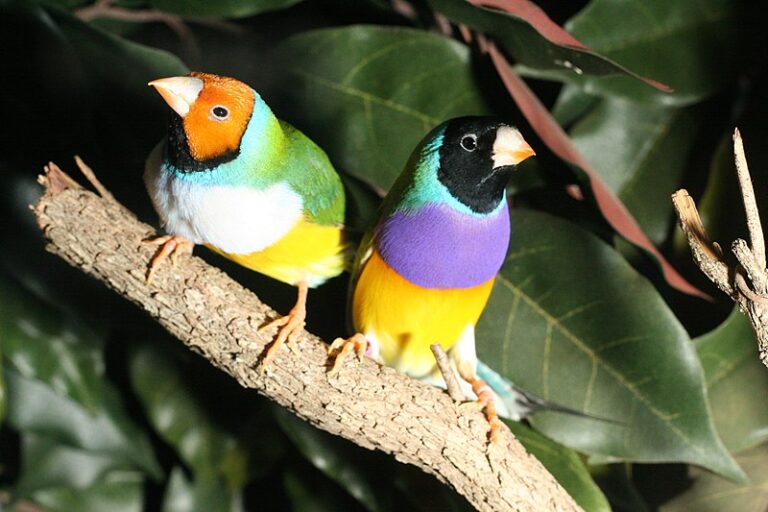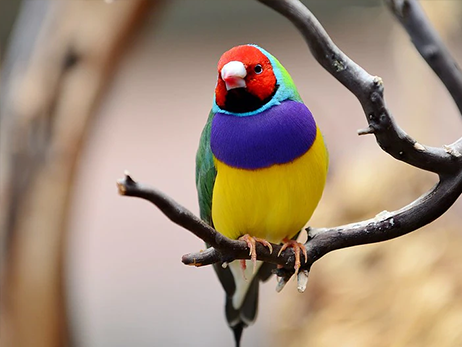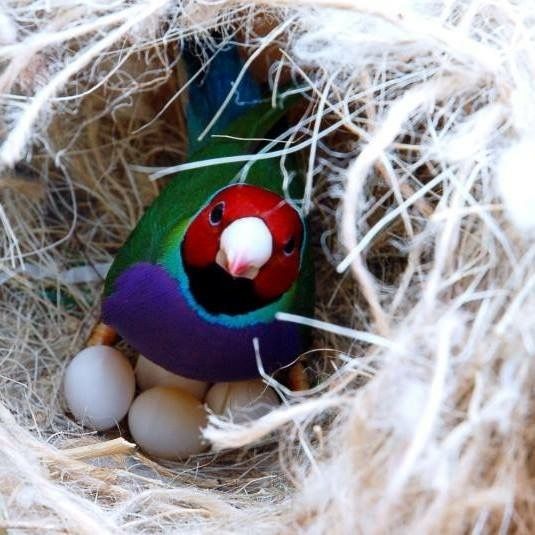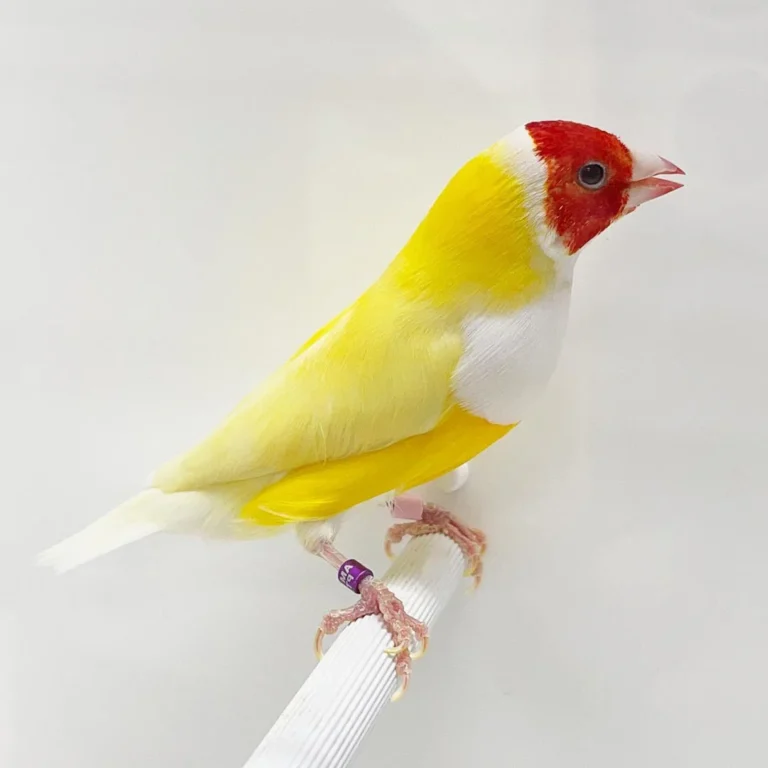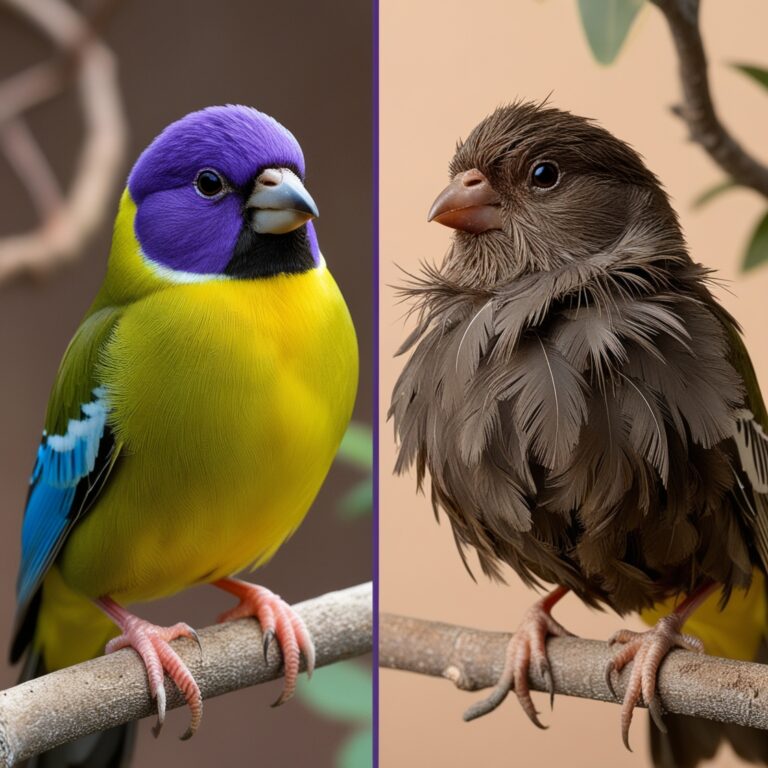How to Spot and Treat Respiratory Infections in Gouldian Finches
Gouldian Finches, with their vibrant plumage and delicate demeanor, are among the most beautiful and sought-after birds for avian enthusiasts. However, like all living creatures, they can fall prey to various health issues, one of the most common being respiratory infections. These infections, if left untreated, can be fatal, making it crucial for bird owners to be vigilant and informed. In this article, we’ll dive deep into how to spot and treat respiratory infections in Gouldian Finches, ensuring that your feathered friends remain healthy and vibrant.
Understanding Respiratory Infections in Gouldian Finches
Respiratory infections in Gouldian Finches can arise from various causes, including bacterial, viral, and fungal agents. Stress, poor diet, and suboptimal living conditions can also contribute to the development of these infections. The most common culprits are Mycoplasma and Chlamydia, which can cause serious illness if not treated promptly. Infected birds often exhibit symptoms similar to those seen in human respiratory illnesses, such as coughing, sneezing, and difficulty breathing.
Recognizing the Symptoms
Spotting the early signs of respiratory infections in Gouldian Finches is crucial for timely intervention. Some common symptoms to look out for include:
- Labored Breathing: If your finch is struggling to breathe, you might notice its tail bobbing up and down with each breath, a condition known as “tail bobbing.”
- Sneezing and Coughing: Frequent sneezing or coughing can be a sign that your bird is dealing with a respiratory issue.
- Nasal Discharge: A runny nose or discharge around the nostrils is a clear indicator of a problem.
- Fluffed-Up Feathers: Birds will often fluff up their feathers when they are feeling unwell, as a way to conserve heat.
- Lethargy: A lack of energy, reluctance to move, or sitting at the bottom of the cage can signal that something is wrong.
- Weight Loss: Sudden or unexplained weight loss can be a sign of a serious underlying condition, including respiratory infection.
- Clicking Sounds: Some finches make a clicking noise when they breathe if their airways are obstructed.
Causes of Respiratory Infections
Understanding the root causes of respiratory infections in Gouldian Finches can help in prevention and treatment. The main causes include:
- Bacterial Infections: Bacteria such as Mycoplasma and Chlamydia are common causes of respiratory issues. These bacteria can be spread through direct contact with infected birds or through contaminated surfaces.
- Viral Infections: Viruses like Avian Influenza can also lead to respiratory problems. These are often more difficult to treat than bacterial infections.
- Fungal Infections: Aspergillosis, a fungal infection, can affect the respiratory system, especially if the bird’s environment is damp or moldy.
- Environmental Stressors: Poor ventilation, drafts, and extreme temperature fluctuations can all weaken a bird’s immune system, making it more susceptible to infections.
- Poor Diet: A lack of essential nutrients can compromise a finch’s immune system, making it more vulnerable to infections.
Diagnosing Respiratory Infections
If you suspect your Gouldian Finch has a respiratory infection, it’s essential to seek veterinary care as soon as possible. A vet will typically perform a thorough examination and may recommend diagnostic tests, such as:
- Physical Examination: The vet will check for visible signs of illness, such as nasal discharge, labored breathing, or fluffed-up feathers.
- Blood Tests: Blood work can help determine if there’s an infection and identify the type of pathogen involved.
- Culture and Sensitivity Tests: These tests can pinpoint the exact bacteria or fungus causing the infection, allowing for targeted treatment.
- X-Rays: In severe cases, X-rays may be needed to assess the extent of the infection and check for any complications, such as pneumonia.
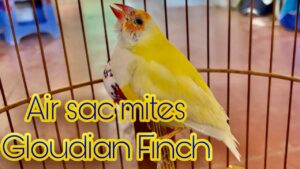
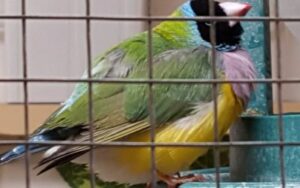
Treatment Options
Treating respiratory infections in Gouldian Finches requires a multifaceted approach. The sooner treatment begins, the better the chances of recovery. Treatment options include:
- Antibiotics: If a bacterial infection is confirmed, your vet will prescribe antibiotics. It’s crucial to complete the entire course of medication, even if your bird seems to improve before the medication is finished.
- Antifungal Medications: For fungal infections like Aspergillosis, antifungal medications will be necessary. These can be more challenging to administer and often require a longer treatment period.
- Supportive Care: Providing supportive care is essential during the treatment process. Ensure your finch is kept in a warm, draft-free environment. You may also need to adjust the bird’s diet to include high-calorie foods to prevent weight loss.
- Nebulization Therapy: Nebulization can be helpful in delivering medication directly into the bird’s respiratory system. This involves using a nebulizer to turn liquid medication into a mist that the bird can inhale.
- Vitamin Supplements: Adding vitamins, especially Vitamin A and Vitamin C, to your bird’s diet can help boost the immune system and aid in recovery.
- Reduce Stress: Minimize handling and keep the bird’s environment calm and quiet. Stress can exacerbate symptoms and slow down recovery.
Preventing Respiratory Infections
Prevention is always better than cure. To reduce the risk of respiratory infections in your Gouldian Finches, follow these tips:
- Maintain Cleanliness: Regularly clean the cage and replace bedding to prevent the buildup of bacteria and fungi.
- Proper Ventilation: Ensure the cage is in a well-ventilated area, free from drafts. Good air circulation is crucial for preventing respiratory issues.
- Balanced Diet: Provide a balanced diet rich in vitamins and minerals to support your finch’s immune system. Fresh fruits, vegetables, and a variety of seeds should be included in their diet.
- Quarantine New Birds: Always quarantine new birds for at least 30 days before introducing them to your existing flock. This helps prevent the spread of any potential infections.
- Avoid Crowding: Overcrowding can lead to stress and the rapid spread of disease. Ensure your finches have ample space to move around.
- Regular Health Checks: Regularly monitor your birds for any signs of illness and seek veterinary care at the first sign of trouble.
When to Seek Professional Help
While it’s possible to manage mild respiratory infections at home with proper care and medication, more severe cases require professional intervention. If your Gouldian Finch shows signs of distress, such as open-mouthed breathing, severe lethargy, or a significant drop in weight, it’s time to seek veterinary help immediately. Delaying treatment can lead to complications, such as pneumonia, which can be fatal.
Conclusion
Respiratory infections in Gouldian Finches are a serious concern that requires prompt attention and care. By being vigilant about the symptoms and understanding the causes and treatment options, you can help ensure your finches remain healthy and vibrant. Remember, a proactive approach with regular health checks, a balanced diet, and a clean, stress-free environment is key to preventing respiratory issues in your birds. If you ever find yourself in doubt, don’t hesitate to consult an avian veterinarian, as early intervention can make all the difference in your finch’s recovery.
FAQs
1. Can respiratory infections in Gouldian Finches be contagious?
Yes, respiratory infections can be contagious, especially if caused by bacteria or viruses. It’s important to isolate sick birds to prevent the spread of infection.
2. How long does it take for a Gouldian Finch to recover from a respiratory infection?
Recovery time can vary depending on the severity of the infection and how quickly treatment is started. It can take anywhere from a few days to several weeks.
3. Can stress cause respiratory infections in Gouldian Finches?
Yes, stress can weaken a bird’s immune system, making it more susceptible to infections. Ensuring a stress-free environment is crucial for prevention.
4. What should I do if my finch refuses to eat while sick?
If your finch isn’t eating, try offering soft foods or hand-feeding. If the bird still refuses to eat, consult a vet as soon as possible.
5. Are there any home remedies for respiratory infections in Gouldian Finches?
While some mild cases may be managed with increased humidity and warmth, it’s always best to consult a veterinarian for appropriate treatment rather than relying on home remedies alone.

